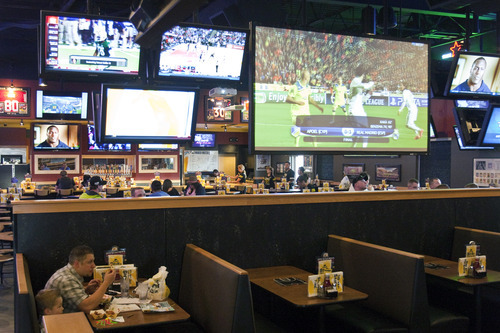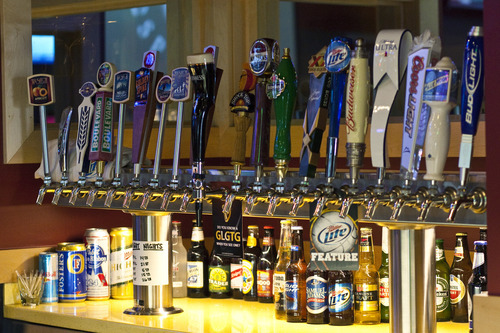This is an archived article that was published on sltrib.com in 2012, and information in the article may be outdated. It is provided only for personal research purposes and may not be reprinted.
Lawmakers are trying to tame the perfect storm they created when they failed to free up enough restaurant liquor licenses to meet demand, while also deciding to allow permit holders to sell existing licenses on the open market, starting in July.
Commercial developers testified on Wednesday during a legislative interim hearing that the state's acute license shortage will cause existing permits to be priced artificially high — pushing small business and entrepreneurs out of the mix. At the same time, national chains probably won't be purchasing licenses for operations in Utah because they typically must have several permits on hand to break into the market and guarantees that more licenses will become available as they build their brands.
"It's simple economics," said Mark Bouchard, senior managing director in Salt Lake City for CBRE, one of the world's largest commercial real estate services firms. "When there is no supply [of licenses] but a great demand, costs will increase significantly."
Restaurant liquor licenses — which are issued based on state population quotas — are so scarce that national chains have had to make do with seasonal permits or they've been placed on a waiting list, if they've come to the state at all.
"How do we un-ring this bell?" Rep. Brad Wilson, R-Kaysville, asked Wednesday.
Sen. John Valentine, R-Orem, who sponsored SB314, which allowed licenses to be sold on the open market, said the intent was to make it easy for restaurants to sell all assets when they closed.
He acknowledged the need for him to bring back proposals to the committee to free up more licenses. But administrative rules or proposed legislation could take months to enact.
A year ago, commissioners at the Utah Department of Alcoholic Beverage Control were so opposed to permit holders selling licenses that they took the unprecedented — but unsuccessful — step of asking Gov. Gary Herbert to veto SB314. The bill also freed up a few restaurants licenses, but it didn't take long for the supply to run dry.
This month, 45 applicants have filed for a variety of liquor permits — but only one, a full-service license allowing all types of alcohol — is available.
At the DABC board's monthly meeting in April, 28 applicants went away empty-handed.
Among those waiting for licenses is the national chain Buffalo Wild Wings, which has locations planned for West Valley City, South Jordan and Riverdale.
The Minneapolis-based chain, with annual sales of $2 billion, had been planning to open 10 to 12 other restaurants in Utah, but so far it has obtained only two licenses, for restaurants in Lehi and Layton.
Steven Bogden, managing director of Coldwell Banker Commercial, said Darden Restaurant Group also is looking to open eateries in Utah, but is stymied by the state's license shortage. The Florida-based firm operates more than 1,900 restaurants and generates more than $7.5 billion in annual sales.
Bogden said the group had planned to open 12 restaurants in Utah, employing 1,000 people and generating sales taxes of $2.7 million.
Another hurdle chains face are laws that lump fine-dining restaurants with bars, said attorney Catherine Parrish Lake. Bars, also called social clubs, may serve alcohol without a meal, while fine restaurants such as Ruth's Chris Steak House have food requirements under dining permits. Both social and dining licenses are lumped together — and 17 applicants have been on a waiting list for the past year.
The restrictions come as the state's demographics tilt toward more imbibers and non-Mormons who don't have the same religious prohibitions against drinking alcohol. Legislative auditors have noted that gallons consumed in Utah from 2001 to 2009 jumped by 54 percent — more than double that of the population increase.
Twitter@DawnHouseTrib —
Utah liquor licenses gone dry
Each month alcohol permits become available through a quota system if the state population grows or if an existing business surrenders its license. In April, 28 applicants went away empty-handed. Here's the breakdown of applicants for the May liquor-control board meeting on Tuesday .
Full service • 15 are vying for a single restaurant permit to serve all types of alcohol.
Limited service • 13 hope to serve beer and wine, but no permits are available.
Club • 17 are on a yearlong wait list to serve alcohol at fine-dining eateries or bars.





